Jan 2013
Sailing sea lion sparks reports of "dead orca"
Jan/31/13 07:04 PM
Seal Sitters’ hotline was flooded with varying reports this evening about a dead whale, some thought to be an orca, just offshore at Constellation Park (aka Charles Richey Viewpoint).
Within minutes, our responders were on the scene scanning the waters with binoculars for the outline of a large marine mammal. In the darkness, our first responder was pretty certain that we were dealing with a sailing sea lion and not a stranded whale. We could see what appeared to be a flipper extended out of the water. However, at that point with virtually no light we could not say for sure that it wasn’t a small orca dorsal fin.
Then, as luck would have it, a KIRO 7 news van was nearby, heard about a dead whale and headed to Constellation. We asked the crew if they had lights to shine out over the Sound so that we might determine what we were up against. The strong beam illuminated the animal sufficiently enough to confirm that, much to our relief, it was indeed a resting sea lion. Huge thanks to KIRO’s Alison Grande and team!
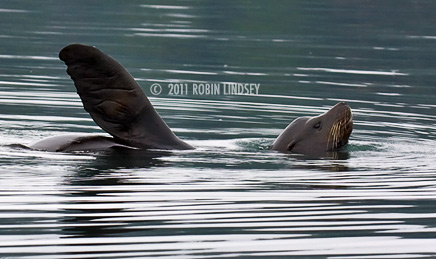 So, what exactly was that sea lion up to? Thermoregulating. Sea lions and other pinnipeds have a system of veins and arteries that transfer heat to the rest of their bodies and organs. This photo of a California sea lion in South Puget Sound shows how they extend their flippers out of the water; the blood in that less insulated part of the body absorbs heat from the sun or warmer air and circulates it through the body to their internal organs. Conversely, on a hot day, you may see a sea lion with flippers to the wind, cooling the blood which then circulates and reduces body temperature. This behavior sparks numerous phone calls each year to both Seal Sitters’ and NOAA’s hotline with reports of “entangled” animals and even sometimes reports of “whales”. Read more about sea lions on our website.
So, what exactly was that sea lion up to? Thermoregulating. Sea lions and other pinnipeds have a system of veins and arteries that transfer heat to the rest of their bodies and organs. This photo of a California sea lion in South Puget Sound shows how they extend their flippers out of the water; the blood in that less insulated part of the body absorbs heat from the sun or warmer air and circulates it through the body to their internal organs. Conversely, on a hot day, you may see a sea lion with flippers to the wind, cooling the blood which then circulates and reduces body temperature. This behavior sparks numerous phone calls each year to both Seal Sitters’ and NOAA’s hotline with reports of “entangled” animals and even sometimes reports of “whales”. Read more about sea lions on our website.
Among the many calls the hotline handled this evening about the “dead whale” was a frantic call from a woman saying she knew we took care of seals, but wanted to report a dead whale and didn’t know who else to call. Seal Sitters would like to clarify for the public that we are a full-fledged marine mammal stranding network, meaning that we respond to reports of ALL marine mammals, from whales to seal pups. Our warm and fuzzy name often gives people the impression that we only deal with seals. That is far from the truth. However, like most marine mammal stranding networks, the majority of responses are to seal pups trying to rest on shore.
Within minutes, our responders were on the scene scanning the waters with binoculars for the outline of a large marine mammal. In the darkness, our first responder was pretty certain that we were dealing with a sailing sea lion and not a stranded whale. We could see what appeared to be a flipper extended out of the water. However, at that point with virtually no light we could not say for sure that it wasn’t a small orca dorsal fin.
Then, as luck would have it, a KIRO 7 news van was nearby, heard about a dead whale and headed to Constellation. We asked the crew if they had lights to shine out over the Sound so that we might determine what we were up against. The strong beam illuminated the animal sufficiently enough to confirm that, much to our relief, it was indeed a resting sea lion. Huge thanks to KIRO’s Alison Grande and team!

Among the many calls the hotline handled this evening about the “dead whale” was a frantic call from a woman saying she knew we took care of seals, but wanted to report a dead whale and didn’t know who else to call. Seal Sitters would like to clarify for the public that we are a full-fledged marine mammal stranding network, meaning that we respond to reports of ALL marine mammals, from whales to seal pups. Our warm and fuzzy name often gives people the impression that we only deal with seals. That is far from the truth. However, like most marine mammal stranding networks, the majority of responses are to seal pups trying to rest on shore.
No worries for seal pup Squiggles at boat ramp
Jan/30/13 07:25 PM
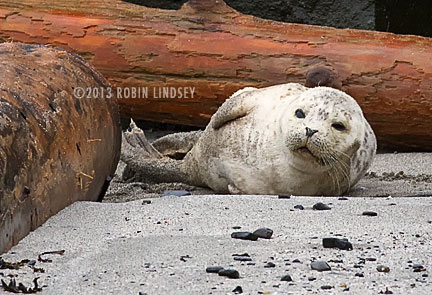
Squiggles barely stirred even as a large boat launched from the ramp opposite her and finally returned to Elliott Bay around 4pm. Seal pups seem to consider the ramp and parking lot as one endless easy access beach, not realizing the extreme dangers of the location with boats and trailers and car traffic.
Rehab Ruby was sighted around 3pm resting on the protected beach at Jack Block Park. Great news - it looks like Ruby has gained some weight since we first saw just over a week ago. We are thrilled that she has chosen West Seattle as her new home.
Resilient volunteers protect seal pups in the cold and damp
Jan/29/13 06:07 AM
Cold, wet weather can’t discourage Seal Sitters on a mission. On Saturday morning, die-hard volunteer Lynn was doing rounds, checking the beaches and docks at Jack Block Park to make sure that rehab pup Ruby and her new-found pinniped friends were safe and sound. She discovered a skitterish pup hauled out on the beach just below the entrance to the public pier. In blustery conditions, with help from fellow volunteer Theresa, a perimeter was established to provide enough space for the pup, nicknamed Scooter, to try to rest undisturbed.
Scooter snoozed throughout the cold, damp day. Shivering volunteers watched over him in shifts and Starbucks generously donated two carafes of coffee to help them thaw out. Thank you, Starbucks on Alki and to our volunteers for braving the elements! Scooter returned to Elliott Bay around 3 pm.
A short time later, Ruby with her red flipper tag was briefly sighted resting on the protected, inaccessible beach below the observatory tower.
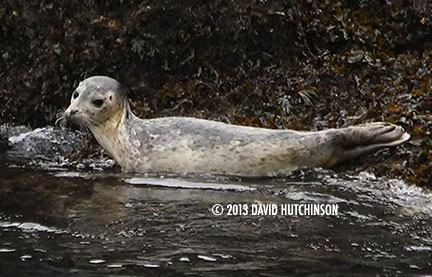 About 10:30 Monday morning, we received a report of a pup hauled out high on the rocks below the seawall along Harbor Avenue. The terribly thin pup had apparently come in at high tide quite early in the morning. Bright yellow tape was stretched between barricades, cones and stakes along the sidewalk above her.
About 10:30 Monday morning, we received a report of a pup hauled out high on the rocks below the seawall along Harbor Avenue. The terribly thin pup had apparently come in at high tide quite early in the morning. Bright yellow tape was stretched between barricades, cones and stakes along the sidewalk above her.
Nicknamed Misty on this soggy day, she napped for hours inside her safety zone, oblivious even to firetrucks zipping by with sirens blasting. Perhaps she was deep in dreams, catching some of the many gunnel the cormorants were feasting on in the cove. If so, we hope those dreams come true because Misty really needs to fatten up to help ward off parasites and respiratory infections. The good news is, we did not observe any coughing spells or significant discharge. She returned to Elliott Bay shortly before 3 as the returning tide swept over her perch. Flipper hugs to the volunteers who endured the rain and educated those who stopped by to ask questions and take a peek at Misty.
Scooter snoozed throughout the cold, damp day. Shivering volunteers watched over him in shifts and Starbucks generously donated two carafes of coffee to help them thaw out. Thank you, Starbucks on Alki and to our volunteers for braving the elements! Scooter returned to Elliott Bay around 3 pm.
A short time later, Ruby with her red flipper tag was briefly sighted resting on the protected, inaccessible beach below the observatory tower.

Nicknamed Misty on this soggy day, she napped for hours inside her safety zone, oblivious even to firetrucks zipping by with sirens blasting. Perhaps she was deep in dreams, catching some of the many gunnel the cormorants were feasting on in the cove. If so, we hope those dreams come true because Misty really needs to fatten up to help ward off parasites and respiratory infections. The good news is, we did not observe any coughing spells or significant discharge. She returned to Elliott Bay shortly before 3 as the returning tide swept over her perch. Flipper hugs to the volunteers who endured the rain and educated those who stopped by to ask questions and take a peek at Misty.
Erroneous news media report of "shot" seal in Ballard
Jan/27/13 11:52 AM
A report yesterday by at least one local news station regarding a seal that had been “shot” at Ballard’s Golden Gardens is erroneous. The station revised the report on their website this morning, saying the seal had been “decapitated” (meaning head cut off). Both reports are incorrect. NOAA would like to stress that there is no evidence whatsoever to support any theory that there was human involvement in the death of this animal. No samples were “collected for investigation” as reported. It is truly unfortunate that this story was aired and published without substantiation by the marine mammal stranding network and has caused undue concern and outrage in the community.
The dead seal is significantly decomposed and most certainly is not the same seal a witness says he saw “playing” on the beach the day before. Many of the dead seals and sea lions that NOAA’s NW Marine Mammal Stranding Networks respond to are in a similarly decomposed state, missing part or all of a head. It is not unusual for the head to become detached - tissue deteriorates and vertebrae snap as the carcass is battered against rocks, logs, debris and ebb and flow of water at the tideline.
Additionally, dead animals are nibbled on by crabs, birds and other scavengers. Damage by birds often looks to the layperson like bullet entry wounds - a smooth, circular area out of the fur.
It is extremely difficult for expert biologists, much less laypersons, to determine if a marine mammal has been shot. Even a suspicious entry wound does not always yield a bullet upon necropsy exam. Biologists look for bullet tracks through hemorrhaged tissue. Often, a radiograph is required to reveal bone fragmentation caused by a bullet.
The animal will not be necropsied due to the decomposition and no evidence of unusual circumstances. Because of an outcry from the public based on this false report, the carcass is being removed from the beach by network volunteers. NOAA and the stranding networks would like to assure the public that there is no cause for alarm in this case.
UPDATE 5:04 pm
Volunteers from Sno-King Marine Mammal Response (the stranding network that responds to beaches of downtown Seattle waterfront, Ballard, Discovery Park, and north to Marysville) removed the seal carcass from the beach this afternoon. In most cases, an animal which is not a candidate for necropsy is identification-marked with a non toxic paint and allowed to return to Puget Sound to nourish other marine life.
To find contact information for the marine mammal stranding network in your area (including Oregon), please click here.
The dead seal is significantly decomposed and most certainly is not the same seal a witness says he saw “playing” on the beach the day before. Many of the dead seals and sea lions that NOAA’s NW Marine Mammal Stranding Networks respond to are in a similarly decomposed state, missing part or all of a head. It is not unusual for the head to become detached - tissue deteriorates and vertebrae snap as the carcass is battered against rocks, logs, debris and ebb and flow of water at the tideline.
Additionally, dead animals are nibbled on by crabs, birds and other scavengers. Damage by birds often looks to the layperson like bullet entry wounds - a smooth, circular area out of the fur.
It is extremely difficult for expert biologists, much less laypersons, to determine if a marine mammal has been shot. Even a suspicious entry wound does not always yield a bullet upon necropsy exam. Biologists look for bullet tracks through hemorrhaged tissue. Often, a radiograph is required to reveal bone fragmentation caused by a bullet.
The animal will not be necropsied due to the decomposition and no evidence of unusual circumstances. Because of an outcry from the public based on this false report, the carcass is being removed from the beach by network volunteers. NOAA and the stranding networks would like to assure the public that there is no cause for alarm in this case.
UPDATE 5:04 pm
Volunteers from Sno-King Marine Mammal Response (the stranding network that responds to beaches of downtown Seattle waterfront, Ballard, Discovery Park, and north to Marysville) removed the seal carcass from the beach this afternoon. In most cases, an animal which is not a candidate for necropsy is identification-marked with a non toxic paint and allowed to return to Puget Sound to nourish other marine life.
To find contact information for the marine mammal stranding network in your area (including Oregon), please click here.
Ruby the rehabbed seal enjoys safer shores of West Seattle
Jan/26/13 06:01 AM
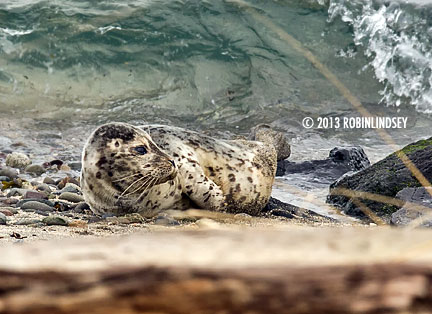
We have learned more about the human interference that landed her in PAWS rehab facility last July. According to WDFW Marine Mammal Investigations, over a period of several days, Ruby had been coming and going from the beach at a park near Steilacoom’s old Saltar Marina. There were reports of her being “poked with sticks” and people pouring water over her. Because she had been harassed by people and apparently abandoned, she was taken to PAWS.
Ruby was given a new lease on life by the wildlife center. Merely a week or so old, she was thin and weighed only 18 lbs. She had some breathing issues and was treated for lungworm. Under PAWS care, she grew into a true “blubberball”, weighing 59 lbs when released in October. Since Ruby was not taught foraging skills by her mom, she would need this fat layer to sustain her while she learned to hunt in the wild. Learning to catch fish in a small rehab pool is very different from catching fast, darting fish in the expanse of Puget Sound.
Ruby’s story drives home the message to STAY AWAY FROM SEAL PUPS. While we cannot say for sure the reason for her presence on shore, perhaps because of her breathing issues and the fact that she couldn’t swim for long periods of time, Ruby was left there while her mom foraged, fully intending to return to nurse her youngster. If a shy mother seal sees people and dogs around her pup, it is extremely likely she will not return. A pup’s best chance for a full and healthy life is always with the mother, learning the skills not only to survive, but to thrive. A rehab facility cannot substitute for a mother’s teachings. SeaDoc Society published some interesting findings from a study comparing the foraging habits of wild weaned seal pups versus rehabilitated pups. The study shows that rehabbed pups travel much longer distances foraging for food than pups raised in the wild. Read it here. Seal Sitters’ seal pup Sandy, rehabbed by PAWS, travelled extensively, too, in search of food only to end up dead, entangled in marine debris.
Seal Sitters hopes Ruby continues to remain in West Seattle where our astute community will make sure she is protected and able to rest undisturbed. If you see a seal pup with a red flipper tag (or, of course, any marine mammal on shore), make sure to call our hotline immediately @ 206-905-7325 (SEAL). We want precious little Ruby to know she is safe on our shores and hopes she packs on a little more blubber.
Rehabbed seal pup makes long journey to the big city
Jan/24/13 09:01 PM
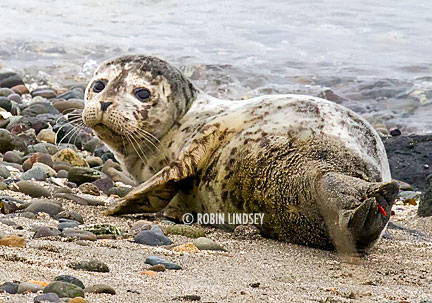
Examining the skittish pup for health issues through her telephoto lens, our responder noticed a red tag on the rear flipper which indicated the animal had been in a rehabilitation facility. Thankfully, before the tag got too covered in sand, we were able to get the numbers for identification. Kristin Wilkinson, NOAA’s marine mammal stranding expert, promptly responded to our inquiry about the pup’s history. The female pup was taken to PAWS Wildlife Center on July 30, 2012, rehabilitated and released at McNeil Island, south of Tacoma, on October 2nd.
What had caused the pup to be taken from the wild? Human interference. The pup had been trying to get some rest on a Steilacoom beach, not too far from several harbor seal rookeries. Only about a week or so old, the tiny pup, alone on shore, was continually “harassed” by people. Most times, a mom will take her pup with her while she forages; however, if the pup is not strong enough to swim for long periods (or has health issues) she will sometimes leave her pup, returning later to nurse. Quite possibly, the mom did not return because of all the human activity. Adult harbor seals are extremely shy and wary of people and will too often abandon their young under these circumstances.
Due to the illegal harassment, WDFW’s Marine Mammal Investigations Unit was forced to take the pup from the beach. Since she could not forage for herself and therefore was not a candidate for relocation to another area, she was taken to PAWS. Upon arrival at the Lynnwood facility, the little female was fluidated and stabilized. After several months of rehab, packing on blubber weight and learning to fish on her own, she was finally released back into the wild.
Seal Sitters is excited to have the opportunity to protect this jewel of a pup, nicknamed Ruby, who has travelled so far and faced such challenges. Under the watchful eye of our West Seattle community, she will get the rest she needs. Ruby returned to Elliott Bay mid-afternoon and has been spotted foraging offshore at Jack Block Park the past two days.
Please check back for additional details about the human interference and her subsequent treatment at PAWS as we gather more information. We had tentatively named the pup Gypsy because of her travels, before realizing we had a pup by that name in September of 2011, who, coincidentally, was also harassed by people.
Busy "off season" continues with seal pup activity
Jan/17/13 10:21 AM
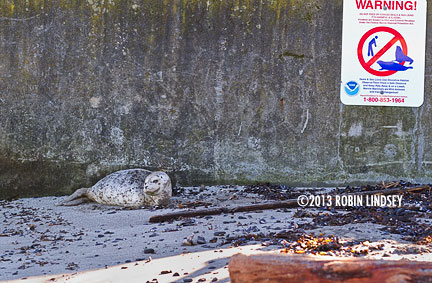
The few boaters who went out yesterday, including the Coast Guard, were very respectful and used the opposite ramp to launch and retrieve their crafts. This sweet little pup, nicknamed Sugar, snoozed until after 7pm last night under the watchful eye of volunteers.
Shortly after Sugar returned to Elliott Bay, the hotline received another call about a pup on Alki Beach across from Cactus. Our responders checked the beach stairs and surrounding beach, but could not locate a pup in the darkness. However, this morning a pup was reported on the steps and our responders quickly arrived and established a perimeter. Shortly afterwards, the pup returned to the Sound as waves swept up over him. Most likely, this is the pup we couldn’t find last night. There are a number of pups resting on the offshore platforms as well today and over the past weeks.
Thanks to the volunteers who shivered in the cold yesterday and this morning!
PBS segment features Seal Sitters and seal pups
Jan/14/13 03:20 PM
A documentary film team from KCTS-9 recently completed a segment on Seal Sitters. Environmental journalist Katie Campbell and videographer Michael Werner interviewed co-founders Brenda Peterson and Robin Lindsey and 11-year old volunteer Etienne, who has been a Seal Sitter since 2nd grade. They filmed volunteers as they protected Lucy and other seal pups.
The story was prompted by our late October report of a West Seattle seal pupping season with emaciated pups and a higher than usual mortality rate for our area (we are happy to say that we ended the year with a wave of chubbier pups). The segment will be airing on PBS, but the audio has already aired on NPR's KUOW and other radio stations. The embedded video shown here is also posted on KCTS 9's website along with the script and photos. Many thanks to Katie and Michael for helping to spread the word that, like all wild animals, seal pups are in a daily struggle to survive and need to be able to rest on shore undisturbed.
The story was prompted by our late October report of a West Seattle seal pupping season with emaciated pups and a higher than usual mortality rate for our area (we are happy to say that we ended the year with a wave of chubbier pups). The segment will be airing on PBS, but the audio has already aired on NPR's KUOW and other radio stations. The embedded video shown here is also posted on KCTS 9's website along with the script and photos. Many thanks to Katie and Michael for helping to spread the word that, like all wild animals, seal pups are in a daily struggle to survive and need to be able to rest on shore undisturbed.
Cold temperatures don't deter resting seal pups - or volunteers
Jan/12/13 08:22 PM
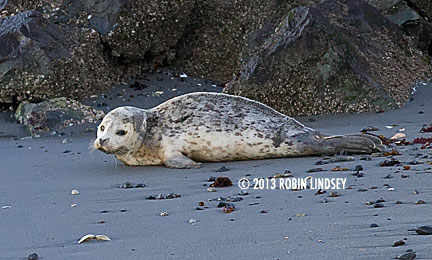
Our responder waited about 20 minutes to see if the pup might resurface, but had a gut feeling that the pup might swim to the small beach at Duwamish Head. She drove the short distance and just as she peered down onto the dark beach, a pup hauled out. After the pup settled in, she proceeded to close off the beach steps and perimeter off the area above the sea wall. Throughout the day in icy temperatures frozen volunteers kept watch. The pup was still on the beach late last night, but was gone before sunrise this morning. While she could definitely pack on some pounds, she was not the terribly thin, coughing pup that had been at the boat ramp the night before. The pup was tentatively named Hermosa, but a comparison of id photos reveal that the pup was Roxy, who had first been sighted a day earlier at the Water Taxi landing with what appeared to be a deep gash. The cut was not apparent to volunteers yesterday.
Last night, the hotline received a frantic call that a pup that had swallowed a squid fishing jig at the Seacrest Park fishing pier. Seeing the pup swim north, the reporting party headed to Don Armeni boat launch where he discovered a pup on the beach. He called, saying there was a pup there who had swallowed a lure. Our first responders arrived at the boat launch within minutes and found a very fat pup resting on the south ramp. Thankfully, the pup was situated under a bright sodium vapor light. We studied the pup closely through binoculars, but could see no evidence of any lure or line or stressed behavior. Instead, the pup seemed very relaxed, stretching and yawing and alert to his surroundings. A perimeter with “Do Not Enter - Protected Marine Mammal” signs was established around the pup. We monitored him closely and sought expert advice from WDFW’s marine biologist. It was determined that it was unlikely he had ingested fishing gear. As late as 10:30 the pup, nicknamed Jigger, was sleeping soundly. Either the pup at the pier did not actually swallow a lure or this was a different pup. Squid is definitely on a seal pup’s menu and the bright lights that fishermen use to attract and catch squid, attract pups to lures as well.
At 5am this morning, our responder found Jigger sleeping, nestled up against the sea wall with only about a foot of beach. Jigger was not alone in the darkness at the boat launch. A blue heron patiently waited to snare a passing fish and a family of otters chattered and chirped at the end of the frosted dock. Finally, at 6:30 fat little blubberball Jigger returned to Elliott Bay, much to the relief of our tired responder in dire need of a shower and some hot coffee.
Busy response day for Seal Sitters volunteers
Jan/10/13 09:04 PM
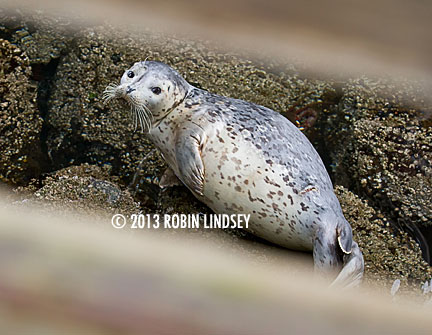
Leaving the park, a man stopped her and said that someone was trying to feed bread to a seal near the water taxi landing. It is against federal law to feed a marine mammal. Thanks so much to that gentleman who apparently drove to Jack Block seeking out a volunteer. She located the pup, nicknamed Roxy (photo above), who appeared to have reasonably good body weight, but also about a 2” long, deep gash near the hip. The incoming tide had engulfed the rock he was resting on and, not too long afterwards, Roxy wiggled off the perch and swam away. Salt water has amazing healing properties, so we hope the wound won’t get infected and impair Roxy’s ability to forage.
Approximately 4:30 this afternoon, two of our first responders did a routine drive through the Don Armeni boat ramp while out on an errand. We regularly check the ramp for hauled out pups due to the extreme danger of that location. Sure enough, a pup was in the middle ramp. A tape perimeter was established and volunteers Theresa, Ana and Jenn gave up dinner to watch over the terribly thin, coughing pup. By 7 pm the pup, nicknamed Nicholas, was a great distance from the receding waterline due to tonight’s extreme low tide. About 30 minutes later, Nicholas began crawling his way back down the bumpy cement ramp to the water’s edge. Shortly before 8, after resting a short while, he disappeared into the waves in a silvery flash.
We will be on the lookout for both of these pups. Should you see a pup resting on shore, make sure to call our hotline at 206-905-7325 (SEAL).
McDreamy sighted on West Seattle beach
Jan/08/13 07:49 PM
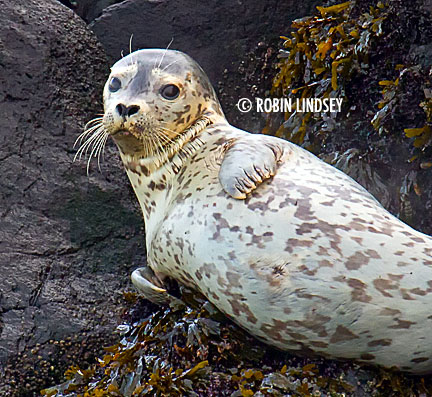
He’s one of a number of harbor seals of all age classes that have been resting on the rocks, beaches, abandoned dock (as many as 8 at a time) and the timber structure of the public pier. In cooperation with the Port of Seattle Police, Seal Sitters MMSN has been closing off the pier whenever a pup has been resting there (or on the rocks a short distance away). The pups climb onto the structure at high tide and rest for many hours. The extreme tides are expected to continue through January. The pier entrance is left open when seals are not hauled out nearby or if tidal conditions are unfavorable to them using the location.
To ensure that the seals are safe from harm or harassment, volunteers monitor the activity at the Park. Both Seal Sitters and the public have enjoyed this unique opportunity to observe these stunning marine mammals foraging, hauling out and interacting. As is usual with weaned pups in wet and cold winter, a few seem to have some respiratory issues, but for the most part, the pups seem pretty healthy. With thinner blubber layers than we’d like to see, the pups need to come ashore not only to rest, but to warm up. McDreamy definitely draws admirers when he shows up on shore!
Seal Sitters is excited that Tully’s Coffee has been purchased by seal pup McDreamy’s namesake Patrick Dempsey. We have a special place in our hearts for the Alki Beach coffee shop, since we had our very first Seal Sitters meeting there in 2007. The staff continues to make us feel welcome even as we sometimes linger a bit too long. We thank Tully’s, Pioneer Coffee and Starbucks for their generous donations of coffee for our training and beach cleanup events!
Thin seal pup rests at Alki Beach
Jan/06/13 09:55 AM
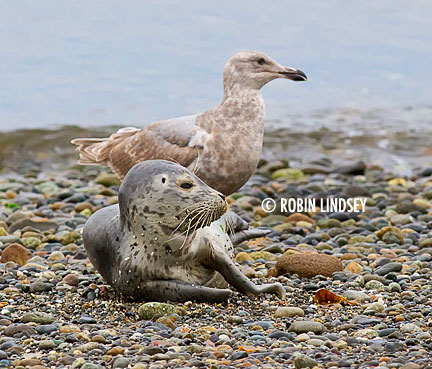
The thin, but alert pup, nicknamed Kitsap, settled in for a nap as people gathered on the sidewalk above. Not too long afterwards, however, a curious young seagull, approached the pup and began pecking at his rear flippers. Needless to say, the pup wasn’t terribly thrilled and flapped his front flipper to deter the gull, who was quite determined to see if there might be something to scavenge on. Eventually, the gull grew disinterested and little Kitsap drifted off for a long snooze. Volunteers watched over the pup til after dark and he (or she) returned to Puget Sound between 8:30 and 9:30 pm.
The photo with a young seagull for scale gives you an idea just how small a 4-6 month old pup can be. Kitsap may be the pup who has been using the offshore platform of late.
Bevy of pups make for a happy ending to year
Jan/01/13 06:41 AM
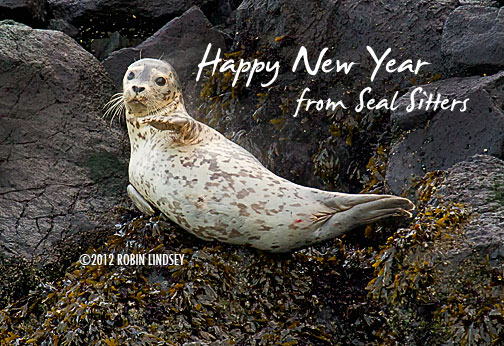
Volunteers continue to closely monitor the activity and educate the public. It has been a unique opportunity for everyone to see these marine mammals in all their beauty so close. With the holiday break, lots of parents with children have been excited to see “baby seals” and dog owners have been very respectful of their presence. One can observe seals interacting with each other and hauling out and thermoregulating (photo above) on the rocks and beach below the tower. People can see firsthand, too, that seals have markings on their coats unique to individuals; this enables Seal Sitters’ first responders to identify them for our database and health assessments.
After a tough seal pup season in late summer and fall with too many emaciated pups and higher mortality rate, this wave of perky pinnipeds has been a thrill for all of us.
Seal Sitters wants to thank our dedicated volunteers for their many hours of participation in 2012 - and heartfelt thanks to those who made generous year-end donations to help defray our operating expenses. We wish our amazing volunteers and the public a happy new year beyond your wildest dreams.
Seal Sitters has begun the process for implementing our 2013: Year of the Seal educational outreach project, culminated by the installation in West Seattle of a bronze sculpture of a harbor seal mom and pup. A children’s essay and art contest is a highlight of the project.







